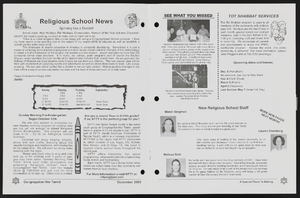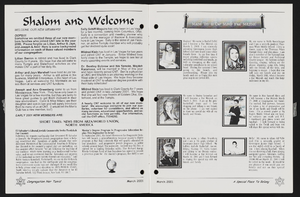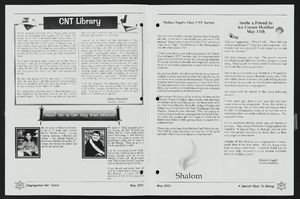Search the Special Collections and Archives Portal
Search Results

Transcript of interview with Michael J. Signorelli by Claytee D. White, Stefani Evans, August 4, 2016
Date
Archival Collection
Description
Michael Signorelli, long-time Las Vegas resident and builder of many local homes, apartments and hotels, describes his upbringing, career, and stellar reputation as part of the “Building Las Vegas” oral history project. Raised in Rhode Island, the only child of an Italian-American father and a Southern Baptist mother, Michael’s early life was influenced by his father’s disability as a World War Two veteran and his non-English speaking paternal grandparents, who owned and ran a grocery store. Talking of his experiences in helping them run the grocery store he says, "I became a businessman at the age of twelve." His military service during the Vietnam War landed him at Nellis Air Force Base in Las Vegas. Once here, Michael furthered his education at UNLV, obtaining both his MEd and PhD degrees. In Las Vegas Michael began his work in the housing arena working for Sun Home Builders and his non-profit work, helping to raise funds for the newly formed Rape Crisis Center. Signorelli went on to work for Howard Hughes's Summa Corporation, where he successfully fought against a discrimination lawsuit brought by twenty-one female dealers. In 1978 Michael started his own company, Nicro Corporation, and began building homes in the Las Vegas valley with land he acquired on a hand-shake and a verbal contract. He continued his non-profit work, which included coordinating Lady Bird Johnson’s Green Thumb project for Nevada and the Pacific Northwest. In the 1980s Signorelli was recruited by the Fitzgerald Group, where he was involved in non-gaming operations for their many hotels, cattle ranch, and an in vitro clinic. In this interview, Signorelli describes his non-Las Vegas building projects in Mesquite and Laughlin. He built the Mesquite Star hotel and casino by overcoming multiple hurdles around water access and money. Despite twice obtaining a loan for one hundred million dollars, he was never able to successfully complete the Laughlin hotel and casino, due to legal issues from his partner’s family trust. Signorelli also shares his idea for a unique hotel and casino called the Nev Star that involved his successful negotiation of a waiver to Senate Bill 208. Signorelli concludes his interview by talking about his ownership of the world-famous Golden Steer Steak House restaurant, which opened in 1958. Under Signorelli’s ownership the Golden Steer has been featured in national publications and claims many legendary fans such as NACAR driver Mario Andretti, who in 2016 celebrated his seventy-six birthday at the Golden Steer. Signorelli’s love of Las Vegas and its many positive traits come forth as he talks about his daughter and her achievements and suggests Vegas promoters should do a better job about what great schools, medical care, and government we have in Las Vegas.
Text

Transcript of interview with Sari and Paul Aizley by Claytee D. White, November 4, 2016
Date
Archival Collection
Description
As Sari and Paul Aizley recall their separate childhoods and journeys to Las Vegas, their work and volunteer histories, their efforts to build a better society, and their life together they speak to each other as much as they respond to questions about their observations on the growth of the Las Vegas urban environment and their contributions to Southern Nevada's cultural development and a just society. In this interview, Sari and Paul speak to the cross-town commute and the physical UNLV campus in the late 1960s; the growth of the UNLV Math Department; the evolution of UNLV's Continuing Education; the State's North-South funding rivalry as reflected in the built environments of University of Nevada in Las Vegas and in Reno; plans to build a paleontology research facility at Tule Springs National Monument; the Review-Journal's "Ask Jessie Emmet" Real Estate column; local ACLU offices and politics; Fair Housing; transgendered persons; the Nevada State Assembly, and Class! magazine for Clark County high school students. Sari and Paul smile at each other as they recall how the editor/publisher met the bearded math professor and fell in love—despite the fact that they tell slightly different versions of their initial meeting(s). Sari passed away November 1, 2017, three days shy of one year after she participated in this interview.
Text

Transcript of interview with Sharon Maurer-Schwartz and Edna Rice by Barbara Tabach, February 1, 2016
Date
Archival Collection
Description
Born in 1939, Sharon Maurer-Schwartz’s life experiences have traversed a groundbreaking era: she’s a female, Jewish and a married to a Protestant lesbian. This oral history reveals what it has been like for her as she explored her Judaism and recognized her personal identity. Her Judaic foundation began in the Reconstructionist movement in Indianapolis, Indiana. She has never wavered from her religious identity, though she has belonged to various types of synagogues. She and Ande (Edna) Rice, who also participates in this interview, were legally married in California in 2008, but have been together since the 1980s. They raised Sharon’s daughter Julie, pursued careers and moved to Las Vegas in 1999. Ande is a Protestant and the topic of blended religious couples is discussed. Sharon is devoted to her life coaching business – Growth Unlimited – and to helping others.
Text

Transcript of interview with Norma Morrow Zuckerman by Barbara Tabach, April 18, 2016 & March 13, 2017
Date
Archival Collection
Description
Norma Morrow Zuckerman is the driving force behind the Jewish Repertory Theatre of Nevada [JRTN], an organization she co-founded with Charlene Sher in 2010. The endeavor coincided with Norma’s pursuit of an MFA at UNLV a couple of years prior. With the commitment to her studies and to bring professional Jewish theatrical performances to Las Vegas, her energetic personality intensified. In 2007, she performed in The Diary of Anne Frank and noted the audience was supporting Jewish Family Services Agency. Norma could sense the community’s eagerness for professional theatre and she was just the one to deliver it. Over the following years, JRTN produced an array of Jewish-themed and acted plays. Since then she tries to bring The Diary of Anne Frank to the stage annually and finds partners to bring 1400 eighth graders to the performance. By 2012, her commute between Los Angeles, where she is a garment designer/manufacturer with her husband Eugene, and Las Vegas had become routine and her passion for professional theatre in Las Vegas increased. This was the year that The Smith Center for Performing Arts opened. The first theatrical production was Golda’s Balcony, a one-woman drama starring Tovah Feldshuh. It was the spectacular co-promotion by Norma’s JRTN and the Smith Center. Norma was smitten with the theatre from a young age and studied with some of the best acting coaches—Milton Kastelas, Stella Adler, Wynn Handman. In this oral history she recalls the people who have helped her, the performances that have charmed audiences and the value of live theatre.
Text

Interview with William Gus Flangas, November 12, 2004
Date
Archival Collection
Description
Text

Interview with Raymond Chester Harbert, July 14, 2005
Date
Archival Collection
Description
Text




